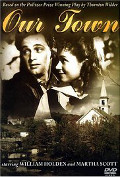
Directed by
Sam Wood
90 minutes
Rated G
Reviewed by
Bernard Hemingway

Our Town
With WWII in full flight in Europe, in its day this paean to small-town America was already distinguished by a wilfully nostalgic insularity (the majority of Americans were opposed to military intervention until Pearl Harbour in December, 1941, n=hit them where it hurt). Today, the image of the happily-united white-bread nuclear family and the routine rhythms of everyday life it celebrates is a thing of the past and its singing of the virtues of conformity and complacency and the bliss of the humdrum wince-inducing, endowing the film with a kind of double-layered datedness.
Based on Thorton Wilder's Pulitzer Prize-winning play about the lives of two families living in white-picket tranquility in Grover’s Corner, New Hampshire Our Town has a relatively unusual structure, taken from the stage production, of a narrator (Frank Craven), an avuncular, pipe-smoking dude and the town’s druggist/soda jerk who addresses the camera directly, intermittently intervening to edit the story as we go back to 1910 and meet the main players notably George (William Holden) and Emily (Martha Scott), two young neighbours who fall in love, get married and bear children thus obliging the time-honoured traditions of their home-town.
In the role of the gee-shucks, baseball-playing teenager, William Holden at 22 years of age was already too old for the part of a 17 year old whilst Martha Scott, at 28 is even more ill-suited (she had played the part in the stage production and was nominated for a Best Actress Oscar) and this, once again from our modern-day perspective tends to thrown into sharp prominence the sentimentally idealized nature of what is depicted, most apparently so in a culminating sequence in which, much like Frank Capra's It’s A Wonderful Life (1946), Emily imagines herself dying and reviewing her mundane but nevertheless precious life.
The 1940s was the last decade that a film of this nature could have been made and even then the innocent pre-Norman Rockwell America it evokes was already a thing of the past. As much as the film purports to capture the eternal in human experience, other than the cycle of birth and death common to all living things and the routine aggravations of child-rearing, what is depicted here is so determined by specific values that we are more aware of the transitory nature of things. Which is just a valid a point of view, only perhaps not so reassuring enough for audiences of the time.
Want something different?





